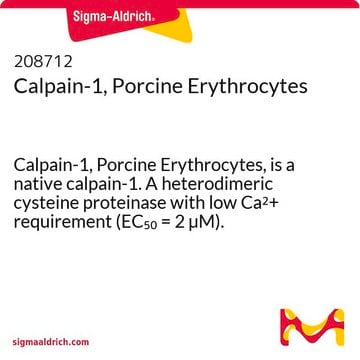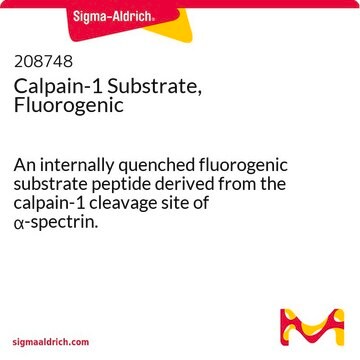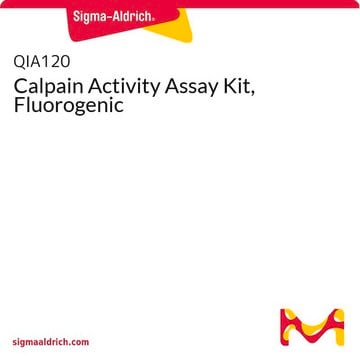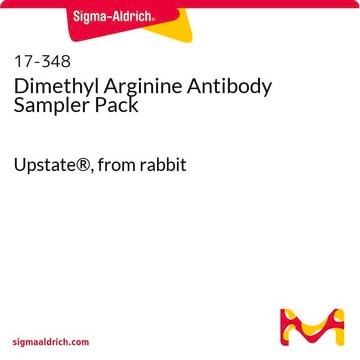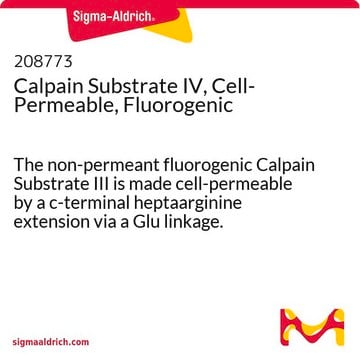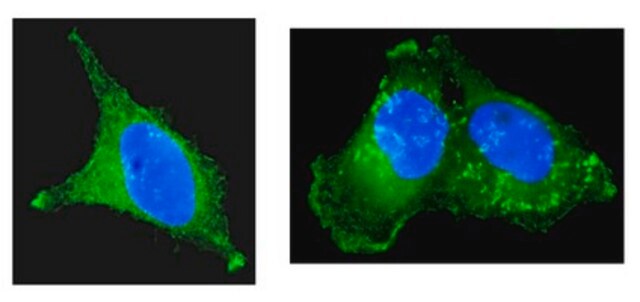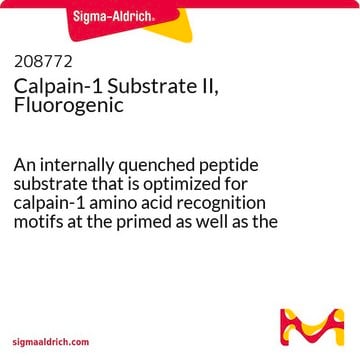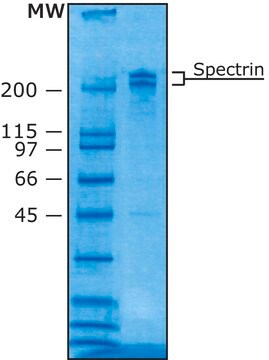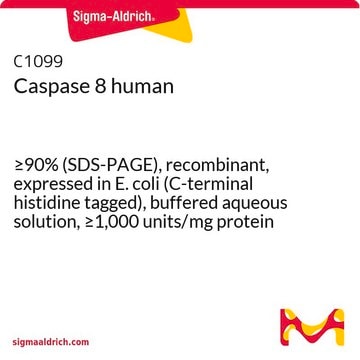208713
Calpain-1, Human Erythrocytes
Calpain-1, Human Erythrocytes, is a native calpain-1. A heterodimeric cysteine proteinase with low Ca2+ requirement (EC₅₀ = 2 µM).
Synonyme(s) :
μ-Calpain
Se connecterpour consulter vos tarifs contractuels et ceux de votre entreprise/organisme
About This Item
Produits recommandés
Niveau de qualité
Forme
liquid
Activité spécifique
≥1000 units/mg protein
Fabricant/nom de marque
Calbiochem®
Conditions de stockage
OK to freeze
avoid repeated freeze/thaw cycles
Conditions d'expédition
wet ice
Température de stockage
−70°C
Description générale
Native calpain-1 from human erythrocytes. Ca2+-dependent cysteine proteinase with low Ca2+ requirement (half-maximal activation = 2 µM). Participates in the ATP release reaction of platelets stimulated with thrombin.
Native calpain-1 from human erythrocytes. Ca2+-dependent heterodimeric cysteine proteinase with low Ca2+ requirement (EC50= 2 µM).
Conditionnement
Please refer to vial label for lot-specific concentration.
Avertissement
Toxicity: Harmful (C)
Définition de l'unité
One unit is defined as the amount of enzyme that will hydrolyze 1 pmol Suc-LLVY-AMC in 1 min, 25°C using the Calpain Activity Assay Kit, Fluorogenic (Cat. No. QIA120). Note: 1 caseinolytic unit = 1 fluorogenic unit.
Forme physique
In 20 mM imidazole, 5 mM β-mercaptoethanol, 1 mM EDTA, 1 mM EGTA, 30% glycerol, pH 6.8.
Notes préparatoires
Prepared from blood that has been shown by certified tests to be negative for HBsAg and for antibodies to HIV and HCV.
Reconstitution
Following initial thaw, aliquot and freeze (-70°C).
Remarque sur l'analyse
Comparable to reference lot by SDS-PAGE
Autres remarques
Vanderklish, P.W., and Bahr, B.A. 2000. Int. J. Exp. Pathol.81, 323.
Sorimachi, H., et al. 1997. Biochem. J. 328, 721.
Croall, D.E., and McGrody, K.S. 1994. Biochemistry33, 13223.
Sorimachi, H., et al. 1997. Biochem. J. 328, 721.
Croall, D.E., and McGrody, K.S. 1994. Biochemistry33, 13223.
Informations légales
CALBIOCHEM is a registered trademark of Merck KGaA, Darmstadt, Germany
Code de la classe de stockage
10 - Combustible liquids
Classe de danger pour l'eau (WGK)
WGK 2
Certificats d'analyse (COA)
Recherchez un Certificats d'analyse (COA) en saisissant le numéro de lot du produit. Les numéros de lot figurent sur l'étiquette du produit après les mots "Lot" ou "Batch".
Déjà en possession de ce produit ?
Retrouvez la documentation relative aux produits que vous avez récemment achetés dans la Bibliothèque de documents.
BmATG5 and BmATG6 mediate apoptosis following autophagy induced by 20-hydroxyecdysone or starvation.
Kun Xie et al.
Autophagy, 12(2), 381-396 (2016-01-05)
Autophagy and apoptosis, which could be induced by common stimuli, play crucial roles in development and disease. The functional relationship between autophagy and apoptosis is complex, due to the dual effects of autophagy. In the Bombyx Bm-12 cells, 20-hydroxyecdysone (20E)
Peter Tompa et al.
The Journal of biological chemistry, 277(11), 9022-9026 (2002-01-26)
The inhibitory domains of calpastatin contain three highly conserved regions, A, B, and C, of which A and C bind calpain in a strictly Ca(2+)-dependent manner but have no inhibitory activity whereas region B inhibits calpain on its own. We
Courtney Blachford et al.
Cell calcium, 46(4), 257-262 (2009-09-08)
Neuronal calcium sensor-1 (NCS-1) is a high-affinity, low-capacity Ca(2+)-binding protein expressed in many cell types. We previously showed that NCS-1 interacts with inositol 1,4,5-trisphosphate receptor (InsP(3)R) and modulates Ca(2+)-signaling by enhancing InsP3-dependent InsP(3)R channel activity and intracellular Ca(2+) transients. Recently
Eshwar R Tammineni et al.
eLife, 12 (2023-02-02)
Calcium ion movements between cellular stores and the cytosol govern muscle contraction, the most energy-consuming function in mammals, which confers skeletal myofibers a pivotal role in glycemia regulation. Chronic myoplasmic calcium elevation ("calcium stress"), found in malignant hyperthermia-susceptible (MHS) patients
Michelle M White et al.
EBioMedicine, 23, 173-184 (2017-08-25)
Identification of mechanisms promoting neutrophil trafficking to the lungs of patients with cystic fibrosis (CF) is a challenge for next generation therapeutics. Cholesterol, a structural component of neutrophil plasma membranes influences cell adhesion, a key step in transmigration. The effect
Notre équipe de scientifiques dispose d'une expérience dans tous les secteurs de la recherche, notamment en sciences de la vie, science des matériaux, synthèse chimique, chromatographie, analyse et dans de nombreux autres domaines..
Contacter notre Service technique